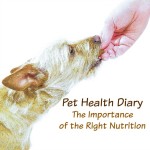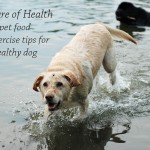There is so much information out there on what you should be feeding your dog and what is considered a ‘healthy diet’ for your four-legged friend. With so much to digest, it’s sometimes hard to know exactly what man’s best friend actually needs in their diet to maintain a healthy lifestyle. We are going to run through a few of the most important things your dog should be getting every day to help them stay healthy for longer!
Dogs are omnivores like us, which means they like to eat pretty much anything, but this doesn’t mean they should. Whilst you might think it’s okay to give your dog human food as a treat every now and again, do you know the effects that this could be having on your dog’s insides? There are a few things they should definitely not eat too; for example, it’s commonly known that chocolate is toxic to dogs, and can cause vomiting and diarrhoea amongst other problems. Treats such as this can cause inflammation, as the food is unfamiliar to their gastrointestinal tract, therefore it is always best to stick to treats designed for your pooch.
Whether you make your dog’s food yourself at home, or you purchase it from a pet shop you should be looking out for some essential ingredients. Remember, what you are putting in to your dogs’ body will be reflected on the outside in their coat, energy and overall health.
Amino Acids
Providing your dog with the essentials that their tissues need to remain healthy and functional, amino acids are found in foods high in protein such as meat and vegetables. It is commonly understood that meat proteins offer more value to your dog than vegetable proteins; however, it is important to provide a balanced diet and you should look to provide some of each in their food.
Vitamins and Minerals
We all need our vitamins and minerals! Vitamins A, E, C and B-12 all play important roles in your dog’s health, whether it’s Vitamins A and E serving as important antioxidants, whilst B-12 aids in cell growth and development. Minerals in your dog’s food will help ensure his teeth and bones remain strong; minerals are involved in many important metabolic reactions working together to coordinate bodily functions, helping to maintain fluid balance and ensuring proper development for your dog. Categorised into two main types, macrominerals and trace minerals, macrominerals are required in larger amounts and these include calcium, phosphorus, magnesium, potassium, etc. whilst trace minerals include iron, copper, chromium, and iodine amongst others which will be required in a smaller amount.
Water
Just as us humans’ need our 8 pints a day, staying hydrated is incredibly important for your dog too. Ensuring he remains well hydrated will keep him happy and healthy and will give him a greater quality of life; it aids digestion and keeps your dog moving.
When you are looking for a dog food to incorporate into a healthy balanced diet for your dog, it’s important to take into consideration a few things, for example his breed, lifestyle, age, weight and overall physiology should play a huge part in your dog food dilemma. Talk to your vet about how many calories and what nutrients your dog needs every day to keep him happy and healthy!
* Article supplied by Petstop.






I have a dog and feel as though she has a really complete diet. She looks and moves so healthily and the vet is always so pleased with her! xxx
I don’t have a dog, but hopefully we’ll get one in the future and I’ll pay close attention to their diet.
It’s so important to make sure our dogs have a balanced diet too 🙂
Jess xo
http://www.theindigohours.co.uk
Thank you for sharing! It is SO important to know what we are giving our furry friends so that they live full and happy lives, as well as knowing what treats are good and bad!
Leigh at Fashion Du Jour LDN HQ
http://www.fashiondujour.co.uk